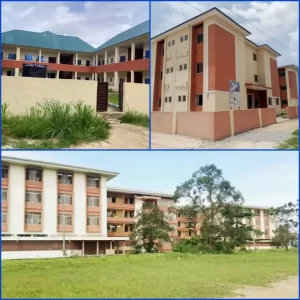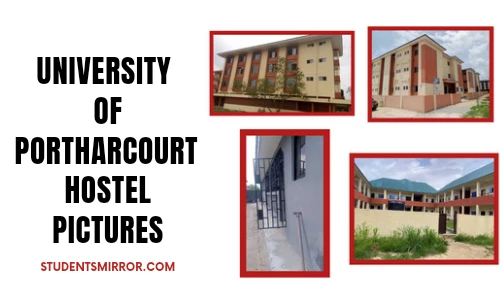In this article, we’ll explore the pictures of UNIPORT Hostel. If you’re an aspiring student of the institution curious about the appearance of the school’s hostel, this article is for you.
While the primary focus is on showcasing UNIPORT hostels through images, we’ll also provide an overview of the institution, covering its history, location, vision and mission, hostel fees, and more.
About UNIPORT
The University of Port Harcourt, located in Choba, Rivers State, Nigeria, emerged in 1975 as University College, Port Harcourt, attaining university status in 1977. Positioned in the Niger-Delta region, it achieved notable recognition, ranking sixth in Africa and first in Nigeria by Times Higher Education in 2015. In July 2021, Prof. George Owunari assumed the role of substantive Vice-Chancellor.
Adhering to National University Commission regulations, the university established a SERVICOM Unit within the Office of the Vice Chancellor. Comprising one college, twelve faculties, and three schools, UNIPORT serves as an entrepreneurial institution.
Upon its inception, the University lacked a Management Sciences department. Instead, there was a brief existence of the Department of Business Studies under Social Sciences, later phased out due to philosophical disparities. Simultaneously, the burgeoning demand for top-level management training from oil companies prompted the creation of an MBA program in 1980 by Professor Lucius.
The MBA program at the University of Port Harcourt, initiated under Professor Lucius, commenced with four functional areas: Accountancy, Finance & Banking, Management, and Marketing. Distinctively following the Harvard style, this Graduate School for MBA was established without an undergraduate base. The introduction of the MBA program marked the inception of a new School of Business – the Graduate School of Management and Business Administration, with Professor Lucius serving as its inaugural Dean.
Professor Lucius’s commitment extended beyond the MBA program. He actively enriched the content of the Department of Business Studies in Social Sciences, offering courses like International Marketing on a part-time basis to B.Sc. students. This part-time initiative catered to the flexibility required by working engineers and executives from various industries pursuing the MBA degree.
The MBA program, designed with the interests of engineers and industrial executives in mind, emphasized a highly quantitative approach. The two-year degree program featured the first 10 courses of the first year as preparatory prerequisites, with the subsequent 10 courses in the second year focusing on specialized subjects. This structure aims to provide a comprehensive and tailored educational experience for professionals in the engineering and industrial sectors.
In 1984, a pivotal development unfolded for the Graduate School of Management and Business Administration (GSMBA) at the University of Port Harcourt. The National University Commission (NUC) sanctioned the establishment of the School of Graduate Studies, tasked with overseeing all graduate degree programs across the university. This directive posed a challenge for GSMBA, prompting either the phase-out of GSMBA or the immediate implementation of an undergraduate (B.Sc.) program to solidify its status as another autonomous faculty.
Choosing the latter option, GSMBA swiftly embraced the opportunity to design and launch an undergraduate program. This decision aimed to establish an undergraduate base and elevate GSMBA to the status of an autonomous faculty within the university. The newly formed Faculty of Management Sciences attracted high-caliber students from Joint Admissions and Matriculation Board (JAMB) applicants. The undergraduate degree program, mirroring the GSMBA’s specialization areas, included disciplines such as Accountancy, Finance and Banking, Management, and Marketing. This transformative shift positioned the Faculty of Management Sciences as a hub for both undergraduate and graduate studies in Business Management at the University of Port Harcourt.
Vision and Mission
The University of Port Harcourt envisions positioning itself among the top universities in Africa, with a notable reputation for excellence in teaching, research, creativity, and innovation. This vision underscores the institution’s commitment to attaining a prominent standing within the academic landscape by excelling across diverse domains.
In alignment with this vision, the University of Port Harcourt outlines a mission focused on academic excellence, knowledge advancement, and community service. The institution strives to achieve these objectives through quality teaching, promoting lifelong learning, fostering social inclusion, contributing to civil society strengthening, and conducting policy-relevant research that addresses contemporary societal challenges. The mission is driven by core values such as the spirit of inquiry, self-reliance, fairness, and adherence to ethical and professional standards across various disciplines. In essence, the University is dedicated to cultivating an environment that encourages intellectual exploration, ethical conduct, and societal impact.
UNIPORT Hostel Pictures
In this section, we’ll be showing you some of the pictures of UNIPORT hostels, as well as some details about them.
In March 2023, NNPC Exploration and Production Limited (NEPL), a subsidiary of the Nigeria National Petroleum Company, completed the construction of a 224-capacity hostel block, which was subsequently handed over to the University of Port Harcourt (UNIPORT). The university had expressed concerns about accommodation constraints, with over 41,000 students residing outside the school premises.

The 224-capacity hostel was built by NEPL to alleviate the accommodation challenges faced by UNIPORT students, emphasizing the security risks associated with students living off-campus.
In February 2020, Belemaoil Producing Limited, an indigenous oil giant, initiated the construction of a 50-bed space hostel at the University of Port-Harcourt (UNIPORT) as part of its commitment to addressing the issue of inadequate hostel accommodation in Nigerian tertiary institutions. The project aimed to mitigate the dangers associated with off-campus living and enhance the academic environment for students.
The construction of the three-floor hostel, a collaboration between Belemaoil Producing Limited, the Jack-Rich Tein Aid Foundation, and Belema Aid Foundation, began two months after the signing of the contract. Mr. Tein T.S. Jack-Rich, the Founder/President of Belemaoil, emphasized the company’s dedication to providing suitable accommodation for Nigerian students and reducing the challenges faced by those residing off-campus.

UNIPORT provides separate hostels for males and females, each with distinct names. The hostels include NUH, NDDC, King Jaja, Mandela, and Amino Kano, among others. For students interested in these accommodations, the hostel fee is N21,000.
UNIPORT School Hostels offer convenient accommodation within the university campus, strategically located in proximity to lecture halls for easy access. The management of the hostels ensures a consistent power supply from either NEPA or the school’s power source, with designated time slots for daily lighting – from 7 p.m. to 11 p.m., 5 a.m. to 8 a.m., and noon to 2 p.m.
However, it’s important to know that cooking is permitted in the School Hostels using kerosene stoves, although gas stoves are prohibited except in the new hostels.
Room allocation typically accommodates 4 to 5 people, although some students may unofficially share a single space. Most hostels provide wardrobes, and students are allowed to bring their cupboards.
Security measures are in place, particularly in girls’ hostels, to ensure a safe living environment. Regular sanitation occurs every Saturday, overseen by wing marshals and hostel chairmen.

